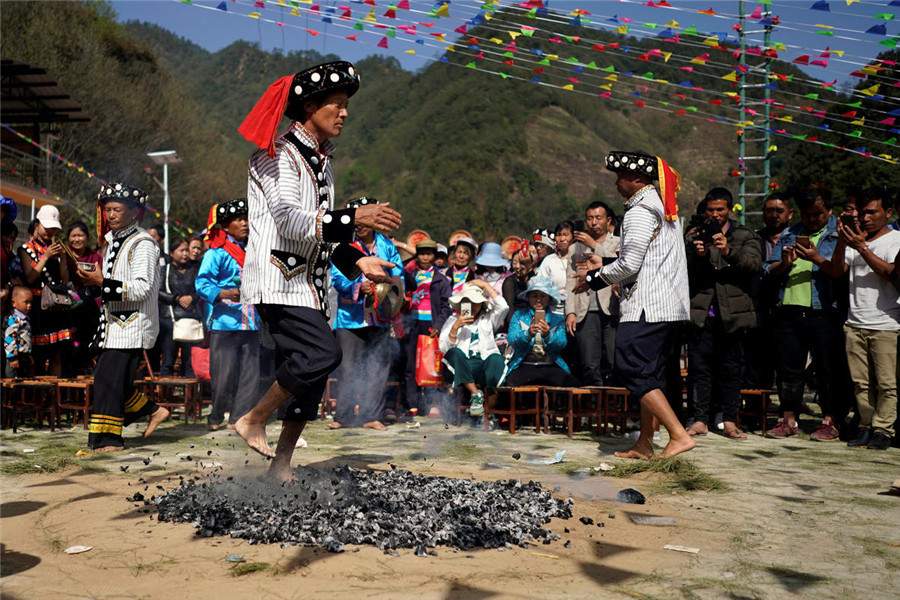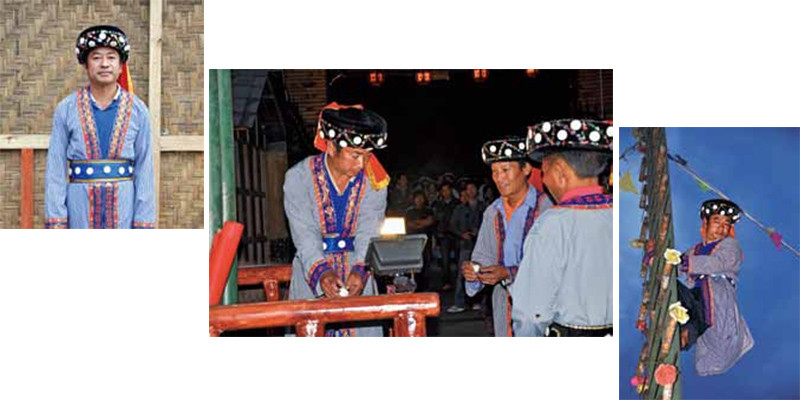 alt="Puer Surrounding Counties and Towns: Weekly & Special Local Markets Travel Guide"
/>
alt="Puer Surrounding Counties and Towns: Weekly & Special Local Markets Travel Guide"
/>
Hu Xuezhong – Representative Inheritor of Yi Knifeladder-Climbing Festival Project in Luzhang Town, Lushui
Name: Hu Xuezong
Gender: Male
Ethnicity: Lisu
Date of Birth: 1965
Place of Birth: Sanchahe Village, Lushui County, Nujiang Lisu Autonomous Prefecture, Yunnan Province
Hu Xuezong is a representative inheritor of the Knife Pole Festival (刀杆节) of the Lisu ethnic group.(怒江州泸水市鲁掌镇三岔河村傈僳族刀杆节项目代表性传承人 – 胡学忠)
In 1980, Hu Xuezong became a disciple of the renowned master Li Xueqiang, known far and wide for his mastery of the Knife Pole Festival’s traditional rituals of ascending Knife Mountain and descending into the Sea of Fire. Over time, Hu Xuezong has surpassed his master in skill. Ascending Knife Mountain and descending into the Sea of Fire are the core activities of the Knife Pole Festival, involving rituals such as igniting fires, wielding knives, performing acrobatics with knives, and erecting knife poles. These are essential ceremonial procedures that Hu Xuezong has mastered.
According to Lisu tradition, during the Knife Pole Festival, the first person to ascend the Knife Pole is called the “Breaker of the Knife,” a title reserved for the most skilled individual. Hu Xuezong has consistently served as the “Breaker of the Knife” in every Knife Pole Festival event. He can flawlessly perform acts such as handstands, rotations, blessings with wine, and blessings with sugar on the sharp blades of the knives. During the descent into the Sea of Fire, Hu Xuezong not only navigates and treads through the flames but also holds and carries burning charcoal in his mouth and hands. Due to his exceptional skills, he has been interviewed by various news media outlets, including China Central Television (CCTV), and has performed during major festivals such as the 6th Yunnan Provincial Folk Games and the “Bathtub Meeting” in Nujiang Prefecture.
Hu Xuezong has taken on two apprentices, breaking the tradition that Lisu women do not participate in ascending the Knife Pole. His efforts contribute significantly to the preservation and development of this folk activity.

http://www.ynich.cn/view-ml-13111-3171.html

 7 Days GolfingTour
7 Days GolfingTour
 8 Days Group Tour
8 Days Group Tour
 8 Days Yunnan Tour
8 Days Yunnan Tour
 7 Days Shangri La Hiking
7 Days Shangri La Hiking
 11 Days Yunnan Tour
11 Days Yunnan Tour
 6 Days Yuanyang Terraces
6 Days Yuanyang Terraces
 11 Days Yunnan Tour
11 Days Yunnan Tour
 8 Days South Yunnan
8 Days South Yunnan
 7 Days Tea Tour
7 Days Tea Tour
 8 Days Muslim Tour
8 Days Muslim Tour
 12 Days Self-Driving
12 Days Self-Driving
 4 Days Haba Climbing
4 Days Haba Climbing
 Tiger Leaping Gorge
Tiger Leaping Gorge
 Stone Forest
Stone Forest
 Yunnan-Tibet
Yunnan-Tibet
 Hani Rice Terraces
Hani Rice Terraces
 Kunming
Kunming
 Lijiang
Lijiang
 Shangri-la
Shangri-la
 Dali
Dali
 XishuangBanna
XishuangBanna
 Honghe
Honghe
 Kunming
Kunming
 Lijiang
Lijiang
 Shangri-la
Shangri-la
 Yuanyang Rice Terraces
Yuanyang Rice Terraces
 Nujiang
Nujiang
 XishuangBanna
XishuangBanna
 Spring City Golf
Spring City Golf
 Snow Mountain Golf
Snow Mountain Golf
 Stone Mountain Golf
Stone Mountain Golf











 What Our Customers Say?
What Our Customers Say?
